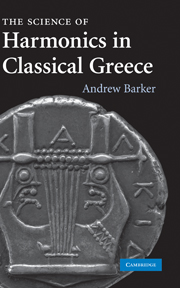Book contents
- Frontmatter
- Contents
- List of figures
- Preface
- Part I PRELIMINARIES
- Part II EMPIRICAL HARMONICS
- Chapter 2 Empirical harmonics before Aristoxenus
- Chapter 3 The early empiricists in their cultural and intellectual contexts
- Chapter 4 Interlude on Aristotle's account of a science and its methods
- Chapter 5 Aristoxenus: the composition of the Elementa harmonica
- Chapter 6 Aristoxenus: concepts and methods in Elementa harmonica Book i
- Chapter 7 Elementa harmonica Books II–III: the science reconsidered
- Chapter 8 Elementa harmonica Book iii and its missing sequel
- Chapter 9 Contexts and purposes of Aristoxenus' harmonics
- Part III MATHEMATICAL HARMONICS
- Postscript: the later centuries
- Bibliography
- Index of proper names
- General index
Chapter 9 - Contexts and purposes of Aristoxenus' harmonics
Published online by Cambridge University Press: 22 September 2009
- Frontmatter
- Contents
- List of figures
- Preface
- Part I PRELIMINARIES
- Part II EMPIRICAL HARMONICS
- Chapter 2 Empirical harmonics before Aristoxenus
- Chapter 3 The early empiricists in their cultural and intellectual contexts
- Chapter 4 Interlude on Aristotle's account of a science and its methods
- Chapter 5 Aristoxenus: the composition of the Elementa harmonica
- Chapter 6 Aristoxenus: concepts and methods in Elementa harmonica Book i
- Chapter 7 Elementa harmonica Books II–III: the science reconsidered
- Chapter 8 Elementa harmonica Book iii and its missing sequel
- Chapter 9 Contexts and purposes of Aristoxenus' harmonics
- Part III MATHEMATICAL HARMONICS
- Postscript: the later centuries
- Bibliography
- Index of proper names
- General index
Summary
Aristoxenus set out to convince his hearers and readers that students of harmonics should adopt the methods of research, the systematic approach, the standards of accuracy and the coherent argumentative strategies that are proper to a science in the Aristotelian mould. If he is to be believed, no previous theorist in the empirical tradition had come close to fulfilling these requirements, and he may very well be right, since the picture of their work which I tried to paint in Chapters 2–3 suggests that they had no such aim in mind. Aristoxenus, by contrast, set himself to the task of transforming harmonics into something it had never been before, a science whose credentials were as recognisable and legitimate as those of any other and which could now take its proper place among the sciences of nature. His repeated insistence on this objective in the Elementa harmonica suggests that he saw it as the most important aspect of his project; and in that case the audience he was addressing must have been composed of people to whom such issues mattered. Aristoxenus, we may conclude, was trying, above all, to persuade his fellow philosophers and scientists in the Lyceum that in his hands the previously trivial discipline of empirical harmonics had developed into one which deserved their intellectual respect.
These conclusions are uncontroversial, unoriginal and unsurprising, and nothing that I say in this chapter is intended to cast doubt on them.
- Type
- Chapter
- Information
- The Science of Harmonics in Classical Greece , pp. 229 - 260Publisher: Cambridge University PressPrint publication year: 2007



